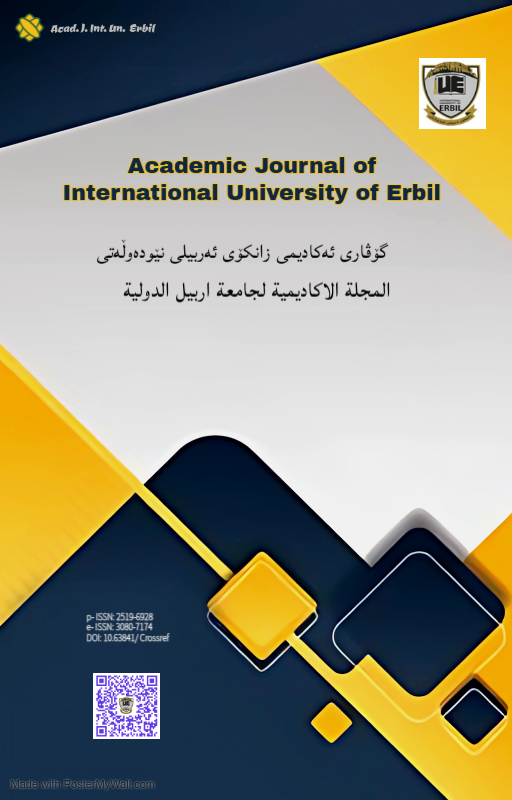Influence of Non-Governmental Organizations on Legislative Processes: A Case Study of the Civil Society Law in the Kurdistan Region of Iraq
Influence of Non-Governmental Organizations on Legislative Processes
DOI:
https://doi.org/10.63841/iue24589Keywords:
Non-Governmental Organizations; Legislative Process; Civil Society Law; Kurdistan Region of Iraq; Governance; Legal Reform; Interest Group TheoryAbstract
This paper examines the factor that has remained relatively unstudied in the literature, namely the influence of non-governmental organizations (NGOs) in informing legislative developments in the Kurdistan region of Iraq (KRI) with emphasis on the Civil Society Law of 2011. Ultimately, filling an important gap in the literature, the study sought to explore the tactics that NGOs use towards the influencing of legislation especially within inter politic systems. Still, more work is required in clarifying the exact ways and tactics through which NGOs influenced this body of legislation, which has, certainly, affected civil society organizations. To collect desired data, this paper adopts a qualitative case study method with both interviews and documentary analysis to capture the strategies and experiences of the NGOs as well as the effects of the NGO engagements on policy making process from the perspective of the target beneficiaries from the Kurdistan parliamentary and non-governmental organizations. The paper is found that NGOs used lobbying, advocacy and alliances in the management of the civil society and the shaping of the Civil Society law. By thus applying the Interest Group Theory to the semi-autonomous regions of a developing country, this study enriches the approaches to analyzing civil society and governance. Thus, it has serious policy implications for countries with opaque governance structures for the need-to-know policymakers, NGOs, and international donors in the pursuit of more effective civil society participation in legal change.
Downloads
References
A. Elliott-Teague, “Interest groups and the legislative process: A comparative analysis,” Journal of Political Studies, vol.13, no.2, pp.23–34, 2007.
S. Silva-Leander, “Interest groups and policy-making in developing countries: A review of the literature,” Journal of Development Studies, vol.51, no.3, pp.1–20, 2015.
R. E. Stake, “The Art of Case Study Research,” Thousand Oaks, CA: Sage Publications,1995.
P. Baxter, & S. Jack, “Qualitative case study methodology: Study design and implementation for novice researchers,” The Qualitative Report, vol.13, no.4, pp.544–559, 2008.
J. W. Creswell, & C. N. Poth, “Qualitative inquiry and research design: Choosing among five approaches (4th ed.),” SAGE Publications, 2017.
H. Kallio, A. M. Pietilä, M. Johnson, & M. Kangasniemi, “Systematic methodological review: Developing a framework for a qualitative semi-structured interview guide,” Journal of Advanced Nursing, vol.72, no.12, pp.2954–2965, 2016.
J. Pancholi, “The influence of NGOs on the strategy process in conflict zones: An institutional theoretical perspective,” Heriot-Watt University, 2019.
N. K. Denzin, “The research act: A theoretical introduction to sociological methods,” Routledge, 2017.
S. L. Nowell, J. M. Norris, D. E. White, & N. J. Moules, “Thematic analysis: Striving to meet the trustworthiness criteria” International Journal of Qualitative Methods, vol.16, no.1, pp.1–13, 2017.
C. Scheytt, & J. Pflüger, “Ethical challenges in qualitative sociology: A systematic literature review,” Frontiers in Sociology, vol.9, 2024. https://doi.org/10.3389/fsoc.2024.1458423
L. D. Brown, A. Ebrahim, S. Batliwala, “Governing International Advocacy NGOs (covers policy impact, environmental and human rights advocacy),” World Development vol. 40, no. 6, pp. 1098–1108, 2012.
B. Haziri, “The Role of Civil Society in Democratic Transition of Kosovo,” The International Journal of Interdisciplinary Civic and Political Studies, vol.19, no.2, pp.89-109, 2024.
A. Jamal, “Democratization and civil society in the Arab world,” Cambridge University Press, 2018.
J. Unerman, & B. O’Dwyer, “Ngo Accountability and Sustainability Issues in the Changing Global Environment,” Public Management Review, vol.12, pp. 475-486, 2010.
M. Farouk-Sluglett, & P. Sluglett, “Iraq since 1958: From revolution to dictatorship,” I.B. Tauris, 2014.
Chartered Governance Institute, “NGO governance,” CGJ HKCGI, 2023.
M. Uddin, & A. R. Belal, “Donors' influence strategies and beneficiary accountability: An NGO case study,” Accounting Forum, vol.43, no.1(Special issue), pp. 113-134, 2019.
L. Radpey, “The Legal Status of the Kurdistan Regional Government (KRG) in International Law,” The Journal of Social, Political and Economic Studies, vol.39, no.4, pp. 397-435, 2014.
M. Benton, & M. Russell, “Assessing the impact of parliamentary oversight committees: The select committees in the British House of Commons,” Parliamentary Affairs, vol.66, pp.772–797, 2013.
S. M. Ahmed, “The Role of Civil Society Organizations in Anti-Corruption Efforts: A Case Study of Integrity Law No. 3 in Iraq,” International Journal of Asian Social Science, vol.4, no.10, pp.1028–1041, 2014.
M. E. Keck, & K. Sikkink, “Activists beyond borders: Advocacy networks in international politics,” Cornell University Press, 1998.
M. J. Pisani, & G. M. Campbell, “Human rights and the military: The case of Honduran human rights non-governmental organizations,” International Journal of Human Rights, vol.14, no.5, pp.667–686, 2010.
D. Truijens, & M. Hanegraaff, “It ain't over 'til it's over: Interest-group influence in policy implementation,” Political Studies Review, vol.21, no.1, pp.1–15, 2023.
P. M. Wagner, P. Ocelík, A. Gronow, T. Ylä-Anttila, & F. Metz, “Challenging the insider–outsider approach to advocacy: How collaboration networks and belief similarities shape strategy choices,” Policy & Politics, vol.51, no.1, pp.47–66, 2023.
C. Hardi, “Gender equality and NGO advocacy in the Kurdistan Region of Iraq,” International Journal of Kurdish Studies, vol.27, no.1, pp.45–65, 2013.
T. Carothers, & D. de Gramont, “Development aid confronts politics: The almost revolution,” Carnegie Endowment for International Peace, 2013.
A. Fung, & E. O. Wright, “Deepening democracy: Innovations in empowered participatory governance,” Politics & Society, vol.29, no.1, pp.5–41, 2001.
B. G. Peters, “Institutional theory in political science: The new institutionalism (4th ed.),” Edward Elgar Publishing, 2019.
R. C. Carpenter, “Setting the advocacy agenda: Theorizing issue emergence and non- emergence in transnational advocacy networks,” International Studies Quarterly, vol.51, no1, pp.99–120, 2007.
J. M. Berry, & K. E. Portney, “The group basis of city politics,” In R. J. Pekkanen, S. R. Smith, & Y. Tsujinaka (Eds.), Nonprofits and advocacy: Engaging community and government in an era of retrenchment (pp. 33–51). Johns Hopkins University Press, 2014.
Aspen Institute, “Meaningfully connecting with communities in advocacy and policy work: A landscape scan,” Fund for Shared Insight, 2019.
H. Wolman, “Policy transfer: What we know about what transfers, how it happens, and how to do it,” George Washington Institute of Public Policy, 2009.
D. Stone, “Non-povernmental Policy transfer: the strategies of independent policy institutes,” Governance, vol.13, no.1, pp.45–70, 2000.
C. Skelcher, N. Mathur, & M. Smith, “The public governance of collaborative spaces: Discourse, design and democracy,” Public Administration, vol.83, no.3, pp.573–596, 2005.
P. A. Sabatier, “An Advocacy Coalition Framework of Policy Change and the Role of Policy Oriented Learning Therein,” Policy Sciences, vol.21, no.2–3, pp.129–168, 1988.
T. Carothers, & S. Brechenmacher, “Closing space: Democracy and human rights support under fire,” Carnegie Endowment for International Peace, 2014.
C. Ansell, & A. Gash, “Collaborative governance in theory and practice,” Journal of Public Administration Research and Theory, vol.18, no.4, pp.543–571, 2008.
A. George, R. Davis, & D. Luff, “Supporting legislative reform: The role of international organizations in promoting good governance,” International Center for Not-for-Profit Law, 2016.
B. A. Simmons, “The international diffusion of liberalism,” International Organization, vol.55, no.4, pp.781–810, 2001.
N. Khalid, “Business Freedom in the Kurdistan Region of Iraq: Environment and Challenges,” Friedrich Naumann Foundation, 2023.
L. Avritzer, & B. Wampler, “Civil society and participatory democracy in Latin America: Institutions, actors, and arenas,” Comparative Politics, vol.40, no.2, pp.135–155, 2008.
P. A. Sabatier, “Theories of the policy process (2nd ed.),” Westview Press, 2007.
R. A. Smail, “Non-Governmental Organizations Participations and the Law-Making Process in the Kurdistan Region of Iraq,” International Journal of Social and Administrative Sciences, vol.4, no.2, pp.267–276, 2019.
H. K. Anheier, “Nonprofit organizations: Theory, management, policy (2nd ed.),” Routledge, 2014.
L. Diamond, “Developing democracy: Toward consolidation,” Johns Hopkins University Press, 1999.
H. Bulkeley, M. Watson, R. Hudson, & P. Weaver, “Governing through design: The politics of redesigning urban infrastructures,” Urban Studies, vol.51, no.12, pp.2367–2383, 2014.
Downloads
Published
Issue
Section
License
Copyright (c) 2025 Academic Journal of International University of Erbil

This work is licensed under a Creative Commons Attribution-NonCommercial-NoDerivatives 4.0 International License.












